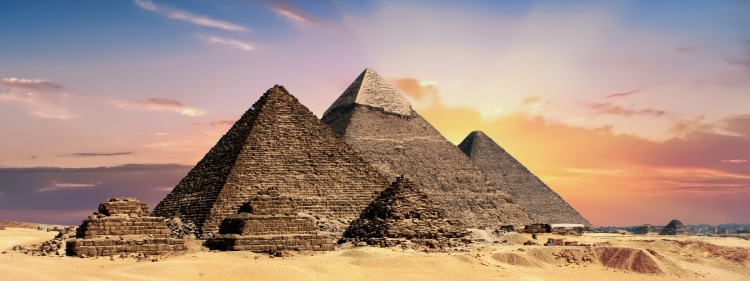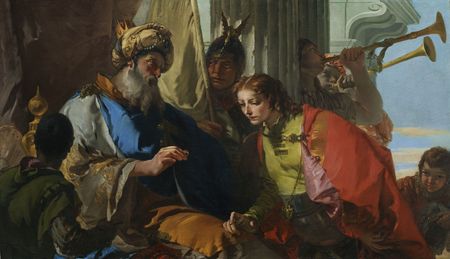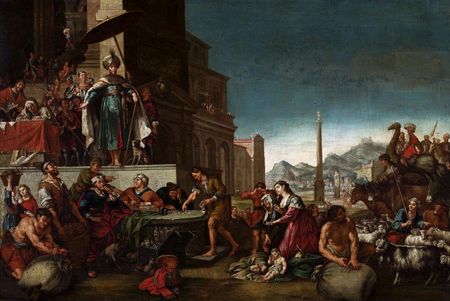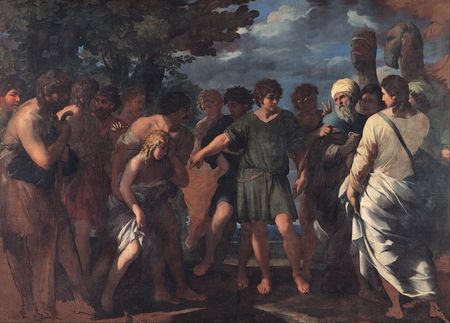Joseph in the Egyptian Empire
- Details
- Category: Empire of Yahweh

The story starts in ancient times with the Pharaoh ruling over the Egyptian Empire. By no means is this an egalitarian society, but still the people of Egypt have a cash-based economy, where they own land and livestock, and have free agency. Into this land comes poor Joseph, a foreigner sold off into slavery by his own brothers.  Joseph has a knack for interpreting dreams, and he deploys his talent to survive and to climb up the ranks, eventually interpreting dreams for the Pharaoh himself. In the course of events, he reveals insider knowledge to the ruler about an impending famine in the land, and hence is asked to take charge of the Pharaoh’s government (Genesis 41:25-45).
Joseph has a knack for interpreting dreams, and he deploys his talent to survive and to climb up the ranks, eventually interpreting dreams for the Pharaoh himself. In the course of events, he reveals insider knowledge to the ruler about an impending famine in the land, and hence is asked to take charge of the Pharaoh’s government (Genesis 41:25-45).
Before the forecasted drought hits, he starts off his time in government by buying food from all over Egypt and hoarding it –
‘Joseph was thirty years old when he entered the service of Pharaoh king of Egypt. And Joseph went out from the presence of Pharaoh, and went through all the land of Egypt. During the seven plenteous years the earth produced abundantly. He gathered up all the food of the seven years when there was plenty in the land of Egypt, and stored up food in the cities; he stored up in every city the food from the fields around it. So Joseph stored up grain in such abundance—like the sand of the sea—that he stopped measuring it; it was beyond measure.’
Genesis 41:46-49
Then comes the famine –
‘Now there was no food in all the land, for the famine was very severe. The land of Egypt and the land of Canaan languished because of the famine’
Genesis 47:13
With the onset of the famine, Joseph starts the systematic dismantling of the Egyptian economic system one step at a time.
- First, he transfers all the cash in the economy from the hands of the people to the hands of the Pharaoh, bleeding everyone completely dry of money. The Pharaoh and his family get to hoard all of Egypt’s cash for their one family while all the families in Egypt go penniless –
‘Joseph collected all the money to be found in the land of Egypt and in the land of Canaan, in exchange for the grain that they bought; and Joseph brought the money into Pharaoh’s house’
Genesis 47:14
- Next, Joseph shakes down the masses for their livestock and makes Pharaoh the sole owner of all the cattle in the land –
‘When the money from the land of Egypt and from the land of Canaan was spent, all the Egyptians came to Joseph, and said, “Give us food! Why should we die before your eyes? For our money is gone.” And Joseph answered, “Give me your livestock, and I will give you food in exchange for your livestock, if your money is gone.” So they brought their livestock to Joseph; and Joseph gave them food in exchange for the horses, the flocks, the herds, and the donkeys. That year he supplied them with food in exchange for all their livestock.'
Genesis 47:15-17
- The following year, having earlier deprived the Egyptian people of all their cash and livestock, Joseph oversees a massive land grab across the nation,
 resulting in the Pharaoh taking over ownership of all the land from the people –
resulting in the Pharaoh taking over ownership of all the land from the people –
'When that year was ended, they came to him the following year, and said to him, “We cannot hide from my lord that our money is all spent; and the herds of cattle are my lord’s. There is nothing left in the sight of my lord but our bodies and our lands. Shall we die before your eyes, both we and our land? Buy us and our land in exchange for food. We with our land will become slaves to Pharaoh; just give us seed, so that we may live and not die, and that the land may not become desolate.” So Joseph bought all the land of Egypt for Pharaoh. All the Egyptians sold their fields, because the famine was severe upon them; and the land became Pharaoh’s.
Genesis 47:18-20
- Having lost everything including their money, livestock and lands, the Egyptian people now have no way to earn a livelihood. Joseph enslaves all of them from one end of Egypt to the other. All citizens are now slaves to the one man at the top, the Pharaoh –
As for the people, he made slaves of them from one end of Egypt to the other.
Genesis 47:21
- Joseph introduces a system of indentured servitude in Egypt with the Pharaoh as the lone beneficiary of the labor of every man and woman in the nation, thereby making the oppressive regime permanent –
Then Joseph said to the people, “Now that I have this day bought you and your land for Pharaoh, here is seed for you; sow the land. And at the harvests you shall give one-fifth to Pharaoh, and four-fifths shall be your own, as seed for the field and as food for yourselves and your households, and as food for your little ones… So Joseph made it a statute concerning the land of Egypt, and it stands to this day, that Pharaoh should have the fifth.”
Genesis 47:23-26
Now, it would be unfair not to highlight the fact that Joseph did help the Pharoah prepare ahead of time for the impending famine, and thus potentially avoided mass starvation through the measures he took. And for this feat, he does get a lot of credit in mainstream narratives and Sunday school stories. But the question worthwhile asking is whether this was the only way he could have gone about achieving that end. Was systematically moving the wealth of the Egyptian people into the hands of the Pharaoh and creating an unequal society where the masses are enslaved to one man the only way to save a nation from the ramifications of a severe drought?
The Irony
 It is important to keep in mind that the Pharaoh and his family were the ones who held the actual power in Egypt and ultimately responsible for the tragic fate of its people, while Joseph was merely holding an administrative job under the ruling family, and he most probably had to operate under their directives behind the scenes. Also, there is a good amount of irony in this story, as Joseph himself had originally been brought to Egypt as a slave after being betrayed by his own brothers (Genesis 37:28). Thus, a former slave in the Egyptian Empire helps the Pharaoh drastically change the fabric of Egypt’s society such that its entire citizenry becomes enslaved to the ruler. The story of Joseph also shows the sad reality of how innocent people who are unwillingly forced to work under an imperial system, soon themselves become vital cogs in the very machinery that had exploited them in the first place and eventually end up facilitating the subjugation of more people under it.
It is important to keep in mind that the Pharaoh and his family were the ones who held the actual power in Egypt and ultimately responsible for the tragic fate of its people, while Joseph was merely holding an administrative job under the ruling family, and he most probably had to operate under their directives behind the scenes. Also, there is a good amount of irony in this story, as Joseph himself had originally been brought to Egypt as a slave after being betrayed by his own brothers (Genesis 37:28). Thus, a former slave in the Egyptian Empire helps the Pharaoh drastically change the fabric of Egypt’s society such that its entire citizenry becomes enslaved to the ruler. The story of Joseph also shows the sad reality of how innocent people who are unwillingly forced to work under an imperial system, soon themselves become vital cogs in the very machinery that had exploited them in the first place and eventually end up facilitating the subjugation of more people under it.
This unjust and unequal societal system of oppression of the Egyptian people, endures a long time in the nation, continuing to cement itself across many successive Pharaohs. Once you concentrate power or wealth in the hands of a few, seldom does history show those men voluntarily giving any of it back to the people.
A man who has absolute power and control over the people of his land tends to seek not only more of that power, but also more of such people over whom he can exercise that power. And years later, when a new Pharaoh takes charge, that’s exactly what he does. Ironically this Pharaoh sees the Israelite people, the very descendants of Joseph’s own family, as potential slave labor to add to his indentured workforce of the Egyptian masses –
'Now a new king arose over Egypt, who did not know Joseph. He said to his people, “Look, the Israelite people are more numerous and more powerful than we. Come, let us deal shrewdly with them, or they will increase and, in the event of war, join our enemies and fight against us and escape from the land.” Therefore, they set taskmasters over them to oppress them with forced labor. They built supply cities, Pithom and Rameses, for Pharaoh... The Egyptians became ruthless in imposing tasks on the Israelites, and made their lives bitter with hard service in mortar and brick and in every kind of field labor'
Exodus 1:8-14
Thus, the unequal society that Joseph helps create in Egypt by exploiting a national crisis, results in the enslavement of both the Egyptian and the Israelite people, causing mass human suffering, all for the benefit of a very few i.e., the Pharaoh and the royal family. And this type of exploitation now in the 21st century plays out at the global level. During the first two years of the Covid-19 pandemic, Oxfam International reports that the world’s ten richest men more than doubled their fortunes from $700 billion to $1.5 trillion, making $1.3 billion a day, while the incomes of 99 percent of humanity fell and over 160 million more people were forced into poverty (Source: Oxfam International, 17th January 2022). “If these ten men were to lose 99.999 percent of their wealth tomorrow, they would still be richer than 99 percent of all the people on this planet,” said Oxfam International’s Executive Director Gabriela Bucher. “They now have six times more wealth than the poorest 3.1 billion people."
So, what is the alternative? Is there a solution that we can glean from the annals of biblical history on how a community of humans can survive and thrive together but avoid the trappings of extreme inequality and exploitation?
Read Next: The Anti-Imperial Yahweh
